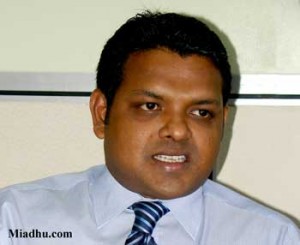Kutti and the coup: what role MP Mohamed Nasheed?
by Aishath Velezinee
For 22 consecutive nights from mid-January 2012 onwards unrest rocked the streets of Male’. This was the planning period of the coup that ultimately brought down the first democratically elected government of the Maldives on 7 February 2012. Political opponents of then President Mohamed Nasheed led the unrest, inciting public anger against him purportedly for violating the constitution.
One of the loudest voices making the claim that President Nasheed had veered wildly off the ‘Constitutional chart’ was that of Independent MP for Kulhudhuffishi Area Mohamed (Kutti) Nasheed. The point he kept reiterating was that in ‘disappearing’ Judge Abdulla Mohamed (commonly referred to as ‘Judge Ablo’), President Nasheed had abused the Constitution.
Given Kutti’s vociferous condemnation of President Nasheed’s said constitutional violation, it seems prudent to take a critical look at Kutti’s own relationship with the constitution as well as his role in the coup, if any.
When Kutti took the stage with the call to ‘Free Judge Ablo’ what he left unsaid is that as leader of the parliamentary committee with oversight of independent commissions he was responsible for ensuring ‘Judge Ablo’ was appointed to the bench legally in the first place.
The question of whether Judge Ablo’s appointment was legal, or whether he is a figurehead sat on the bench by political players using undue influence, is a question sitting before the parliamentary committee for some time now.
While on the Judicial Service Commission (JSC), I personally submitted a large dossier of information to the Committee, documenting what I allege is treasonable activities by the Commission between 23 February 2010 and 4 August 2010.
I am also aware that the Anti-Corruption Commission (ACC) also sent a request to Kutti’s Committee, again with a large cache of information, asking that it investigate the allegation that JSC had violated Article 285 of the Constitution. I found out about ACC’s request on the evening of 6 February 2012. The following day the democratically elected government was brought down.
The Independent Commissions Committee of the Majlis had before it the issue of why the JSC arranged for all judges to be sworn in at a secret ceremony on 4 August 2010, rendering the Constitution irrelevant. The Majlis has not paid any heed.
When we look at what the Majlis did—or more precisely failed to do—what we see is an attempt to bury the problem, encouraging by its inaction the corruption of the judiciary. In relation to the complaint lodged at the Majlis on 23 February 2010, the Majlis summoned the JSC about three times, but cancelled each time without reason.
I sent several more letters to the Majlis, they were all ignored. I then went to the media to talk about it; once the media started ignoring the issue, too, I took to the streets, distributing flyers to the public about the destruction of judicial standards and independence. Finally, when a large number of people began to speak out about the issue, the JSC was summoned to the Majlis on 2 August 2010. Although it was Mohamed Mujuthaz who presided over the meeting, from what I saw, it was Kutti Nasheed who was leading the proceedings—via SMS.
The allegations before the meeting was that the JSC had violated the Constitution, cunningly conspired to dismiss Article 285 as ‘symbolic’ and decided to re-appoint to the bench, en-masse, all Gayoom’s judges without any consideration to their education, qualification or ethical principles and standards. The issue it needed to inquire into was that the JSC had failed in its responsibility to deliver to the people an independent, competent and capable judiciary.
The meeting was a farce that lasted about three hours. It allowed then JSC President Mujuthaz Fahmy to speak freely with no consideration of truth and without being asked for proof or evidence to back up anything he said. Meanwhile, I was given no chance to speak, and the complaint I had lodged against the JSC was kept out of the proceedings. This is why I am saying the Majlis was complicit in, and facilitated, the JSC’s silent coup against the first democratically elected government of the Maldives.
Kutti Nasheed seems to have been unaware—even when he presided over the Committee meeting with JSC on 2 February 2010—that it was the responsibility of the Committee to investigate the allegations against JSC; and that Abdulla Mohamed could not be accepted as a judge under the current constitution.
More than this, Kutti Nasheed also wrote a letter to JSC in his capacity as an MP, opining that Article 285 of the Constitution is meaningless and, thus, advising the JSC to act outside of the Constitution by dismissing it as symbolic. And, at the time when Abdulla Yameen and Gasim Ibrahim were arrested in June/July 2010, Kutti Nasheed took a lead role in the Majlis attempting to remove all legislative restraints on conspiring to overthrow the government. This to me shows this was a coup long time in the planning. If my memory serves me correctly, it was also around this time that Kutti Nasheed made the now infamous ‘I need some cash’ phone call to Gasim Ibrahim.
The judiciary was unduly influenced, destroyed, and justice was denied to the public by the same people who we saw leading the 7 February 2012 coup. With the support of Kutti Nasheed.
*This article was first published in Dhivehi by former member of JSC, Aishath Velezinee, in the Dhivehi Language current affairs magazine Adduvas.

7 comments